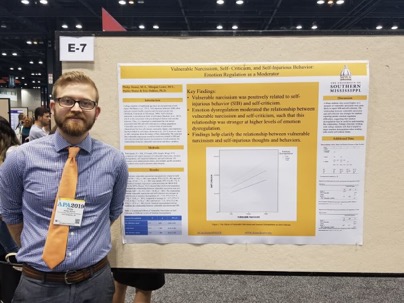
Director: Eric R. Dahlen, Ph.D.
Summer Boggs Defends Thesis
06/16/23 Aggression
Summer Boggs, a doctoral student working in the lab, successfully defended her master’s thesis yesterday. Summer’s thesis, "Social Anxiety and Relational Aggression in the Peer Relationships of College Women," examined the possible role of fear of negative evaluation in relational aggression in a sample of college women, utilizing Social Information Processing theory. Summer's sample proved to be unusually high on every measure of anxiety used, suggesting some limitations in the generalizability of her findings. Contrary to her predictions, fear of negative evaluation was not associated with higher levels of relational aggression. On the other hand, a broader measure of social anxiety did show a relationship with relational aggression, some of which was mediated by hostile attribution bias.
Congratulations to Summer on her successful thesis defense!
Congratulations to Summer on her successful thesis defense!
Summer Boggs Proposes Thesis
03/09/22 Aggression
Summer Boggs, a doctoral student working in the lab, successfully proposed her master’s thesis earlier this week. Summer’s thesis aims to advance the literature on relational aggression among college students by focusing on the fear of negative evaluation component of social anxiety, as suggested by Andrews and colleagues’ (2019) application of Social Information Processing theory. She plans to test hostile attribution bias as a mediator and to include empathy as a moderator of at least one predicted relationship. The literature is filled with conflicting findings about the relationship between social anxiety and relational aggression, so we hope that Summer’s project can help to clarify it.
Congratulations to Summer on her successful thesis proposal!
Congratulations to Summer on her successful thesis proposal!
Lab Represented at APA
08/12/19 About

Philip’s poster was based on his master’s thesis and described his finding that emotion regulation moderated the relationship between vulnerable narcissism and self-criticism. Hailee’s poster, which also utilized data collected as part of Philip’s thesis project but not used in his thesis, described her finding that anxiety moderated the relationship between peer exclusivity and relational aggression among college students.
Hailee is completing her honor’s thesis in the lab, and this was her first professional conference. She received a Discovery Scholar Research Grant from the Honors College at the University of Southern Mississippi, which supported her travel to Chicago.
Congratulations on a successful conference!
Daniel Deason Accepts Job at Ole Miss
07/10/17 About

We are currently working on a paper based on Daniel’s master’s thesis that examines the contribution of social anxiety to the Five Factor Model (Costa & McCrae, 1992) of personality in understanding relational aggression in college students.
Congratulations to Daniel on the new job!
Daniel Deason Defends Master's Thesis
10/13/14 Aggression
Daniel Deason successfully defended his master's thesis today, Personality and Relational Aggression in College Students: The Role of Social Anxiety and Rejection Sensitivity. Daniel's study examined the utility of the Five Factor Model (FFM) of personality, as well as social anxiety and rejection sensitivity in predicting relational aggression in college students' peer and romantic relationships.
In examining the zero-order correlations between the FFM constructs and relational aggression, both peer and romantic relational aggression were inversely related to agreeableness, conscientiousness, and emotional stability (i.e., the inverse of neuroticism). Thus, more relationally aggressive students scored lower on agreeableness, conscientiousness, and emotional stability.
When peer relational aggression and romantic relational aggression were each regressed on the five FFM constructs, extraversion, agreeableness, and emotional stability emerged as significant predictors. Students reporting more relational aggression tended to be more extraverted, less agreeable, and have lower emotional stability.
Based on the literature, the strongest case could be made for the role of agreeableness and emotional stability. So, sequential regressions designed to take student gender and race into account were conducted. Agreeableness and emotional stability predicted peer relational aggression; emotional stability predicted romantic relational aggression.
Finally, the incremental validity of social anxiety and rejection sensitivity was tested over and above participant gender, race, and the full FFM. Social anxiety but not rejection sensitivity demonstrated evidence of incremental validity here. Interestingly, extraversion joined agreeableness and emotional stability as predictors of both peer and romantic relational aggression, suggesting that this variable may be more relevant than was previously thought.
Additional analyses will be needed to better evaluate the potential role of participant gender and race, so we will be sure to share them here once they are completed.
In examining the zero-order correlations between the FFM constructs and relational aggression, both peer and romantic relational aggression were inversely related to agreeableness, conscientiousness, and emotional stability (i.e., the inverse of neuroticism). Thus, more relationally aggressive students scored lower on agreeableness, conscientiousness, and emotional stability.
When peer relational aggression and romantic relational aggression were each regressed on the five FFM constructs, extraversion, agreeableness, and emotional stability emerged as significant predictors. Students reporting more relational aggression tended to be more extraverted, less agreeable, and have lower emotional stability.
Based on the literature, the strongest case could be made for the role of agreeableness and emotional stability. So, sequential regressions designed to take student gender and race into account were conducted. Agreeableness and emotional stability predicted peer relational aggression; emotional stability predicted romantic relational aggression.
Finally, the incremental validity of social anxiety and rejection sensitivity was tested over and above participant gender, race, and the full FFM. Social anxiety but not rejection sensitivity demonstrated evidence of incremental validity here. Interestingly, extraversion joined agreeableness and emotional stability as predictors of both peer and romantic relational aggression, suggesting that this variable may be more relevant than was previously thought.
Additional analyses will be needed to better evaluate the potential role of participant gender and race, so we will be sure to share them here once they are completed.
Daniel Deason Proposes Thesis on Personality and Relational Aggression
09/18/13 Aggression
Daniel Deason, a doctoral student in his second year, successfully proposed his master's thesis today. He did a great job presenting his study and obtained approval from his committee to move forward.
Daniel's thesis, Personality and Relational Aggression in College Students: The Role of Social Anxiety and Rejection Sensitivity, will examine the utility of the Five Factor Model (FFM) of personality, social anxiety, and rejection sensitivity in predicting relational aggression between peers and romantic partners. We expect that some of the Big Five personality factors will predict relational aggression but that social anxiety and rejection sensitivity will explain additional variance in relational aggression beyond the contribution of the FFM.
Daniel's thesis, Personality and Relational Aggression in College Students: The Role of Social Anxiety and Rejection Sensitivity, will examine the utility of the Five Factor Model (FFM) of personality, social anxiety, and rejection sensitivity in predicting relational aggression between peers and romantic partners. We expect that some of the Big Five personality factors will predict relational aggression but that social anxiety and rejection sensitivity will explain additional variance in relational aggression beyond the contribution of the FFM.
